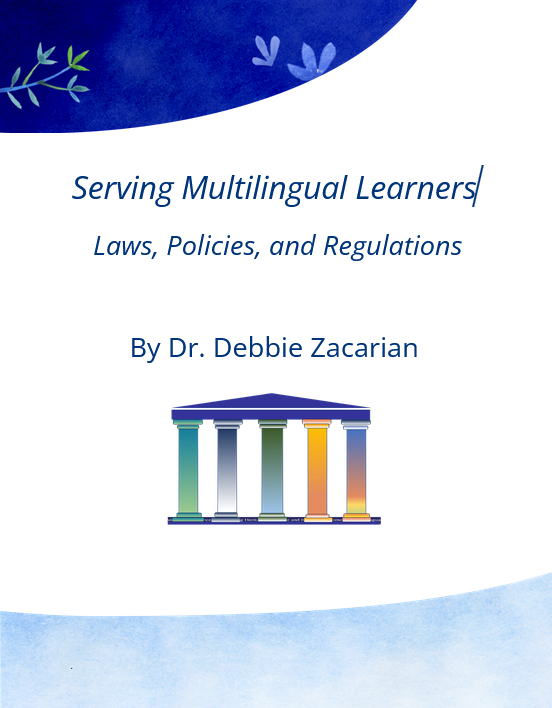The tenth key topic of the Dear Colleague Letter focuses on communication with MLs' families. Federal regulations explicitly state that schools and state education agencies are obligated "to ensure that parents and guardians [of MLs] have meaningful access to district and school-related information" (U.S. Department of Justice & U.S. Department of Education, 2015, p. 2).
Guiding Questions
Download this guide
 This guide is also available in a PDF version for download and printing.
This guide is also available in a PDF version for download and printing.
- What do the federal regulations require of local education and state education agencies to ensure that parents and guardians of MLs have access to school-related information?
- What is important to know about the research on family-school partnerships and engagement?
- What action steps should be taken to ensure meaningful communication with MLs' parents and guardians?
A Note on Terminology
- The strengths-based term multilingual learner is used throughout this document to recognize and value students' existing language abilities and highlight what they know. Keep in mind that states may use different terms and that many federal documents use the terms "English learner" and "Limited English Proficient students." See the federal definition of a multilingual learner in Who Are Multilingual Learners?
- The terms "parents and guardians" and "families" are used interchangeably to refer to the legal guardians of a child (e.g., parents in two-parent or single-parent families, grandparents, stepparents, foster parents, custodial parents, and in some cases, other relatives with guardianship). More broadly, "families" can also include siblings, relatives, and members of students' extended families and communities who are involved in students' lives and education.
What Schools Need to Know
Federal regulations explicitly state that schools and state education agencies are obligated "to ensure that parents and guardians [of MLs] have meaningful access to district and school-related information" (U.S. Department of Justice & U.S. Department of Education, 2015, p. 37). Further, federal regulations specify:
"This essential information includes but is not limited to information regarding: language assistance programs, special education and related services, IEP meetings, grievance procedures, notices of nondiscrimination, student discipline policies and procedures, registration and enrollment, report cards, requests for parent permission for student participation in district or school activities, parent-teacher conferences, parent handbooks, gifted and talented programs, magnet and charter schools, and any other school and program choice options." (U.S. Department of Justice & U.S. Department of Education, 2015, p. 38).
The Importance of Family Engagement
Research on family engagement affirms that families are important partners in their child’s education. While the importance of family involvement is widely recognized, its unique significance for families from linguistically and culturally diverse backgrounds is sometimes overlooked. Many educators may not be familiar with the cultural norms of MLs and their families, as well as their strengths and assets. Conversely, many ML families may not fully understand the culture of U.S. public schools, including the implied ways of thinking, being, and acting shaped by the dominant culture. These differences can lead to misconceptions and misunderstandings on both sides, potentially creating barriers that divide and separate communities.
However, partnerships between schools and ML families have been shown to help students thrive socially and academically while fostering mutual understanding. Creating partnerships with families of MLs calls for educators to:
- Help families understand the routines and practices of school
- Help the school community understand the family communities of MLs
- Bring together the collective assets of families, educators, and local communities before-, after-, and in-school through ongoing partnerships.
Related resources
See more in this related resource collection on multilingual family engagement and English Learner Toolkit: Chapter 10.
In addition, see the following articles for building, training, and sustaining an effective cadre of interpreters and translators. Each features insights from Dr. Jennifer Love, Director of Language Access Services for Prince George's County School District in Maryland:
- Equity Through Language Access: Best Practices for Collaborating with Interpreters
- Building Interpreter and Translator Networks
Wolfe Street Academy, Baltimore |
|---|
An example of the type of family/school partnerships is Wolfe Street Academy, a community school serving a large ML population in Baltimore, MD. Like many schools across the globe, it made the rapid shift from in-person to remote schooling when COVID-19 struck. Prior to the pandemic, its after-school programming had been an integral part of students' lives. Rather than forgo this mainstay, Wolfe Street quickly and adeptly launched several after-school remote activities including yoga, robotics, art, and debate classes taught by staff, ML families, and members of the local community (Zacarian, 2023; Zacarian, Calderón, and Gottlieb, 2021). See more from Wolfe Street in this special Colorín Colorado video project, How a Community School Helps ELLs Succeed. |
Tools for Educators
These tools can support educators in their work related to communicating with families. A printable version of these questions is available in the PDF version of this guide.
Action Steps: Ensure Meaningful Communication with MLs' Parents and Guardians |
|---|
The following resource of action steps, drawn from Zacarian (2023, p. 202), is intended to support meaningful communication with parents and guardians of MLs.
|
Copyright© 2023 by Corwin. All rights reserved. Adapted from Transforming Schools for Multilingual Learners: A Comprehensive Guide for Educators, Second Edition by Debbie Zacarian. Thousand Oaks, CA: Corwin, www.corwin.com. Posted with permission from Corwin Press.
Related Videos
A warm welcome for immigrant families in the front office
Norieah Ahmed, the Child Accounting Secretary at Salina Elementary School in Dearborn, MI, talks about her role in welcoming newcomer immigrant families to the school from the moment they walk in the door.
This video is an excerpt from our 20-minute film, You Are Welcome Here: Supporting the Social and Emotional Health of Newcomer Immigrants.
Henry Sales, Mam Educator: Indigenous Families' Rights to Translated Information from Schools
Henry Sales, a Mam educator who was born in Guatemala, explains that all families, including those who speak Indigenous languages, have a right to information in their home languages from their child's school. You can see this video in Spanish and Mam as well.
This video is an excerpt from our trilingual video collection, Partnering with Indigenous Families from Latin America.








Add new comment